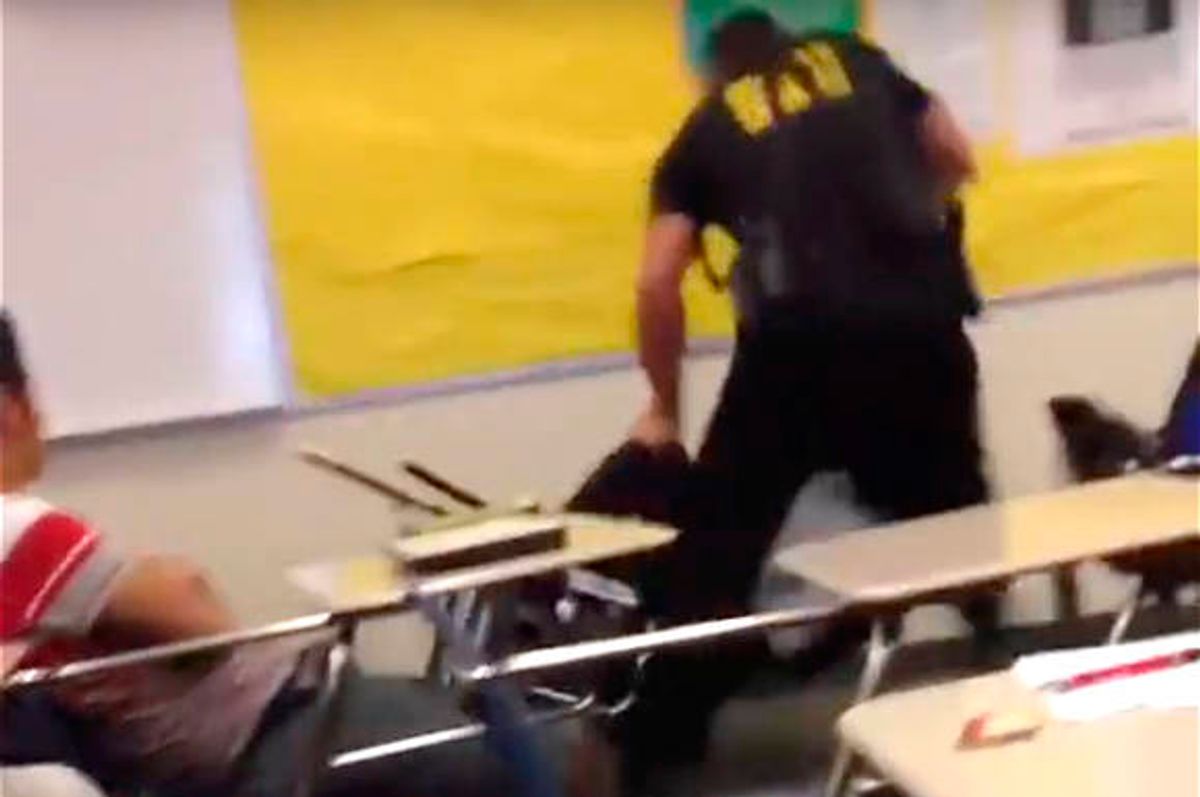The most disturbing video violence yesterday was not on premium cable but off of a cell phone video, taken in Richland County, South Carolina. In it, a “school safety officer” named Ben Fields puts a barely resisting student into a headlock and then forcibly tries to remove her from her desk. She becomes tangled in the desk, so Fields slams both the student and the desk into the floor. It’s difficult to see what happens next, as the student is obscured by other students. But before she disappears completely from sight, Fields picks up the student by the pant leg and wrist and tosses her, underhand, down the aisle of desks.
That 15-second video isn’t the whole story, but it contains all the information you need. The first tell is that the room is almost completely silent. The other students don’t dare to say a word, and neither does the student. Some of the visible students are hunched over their desks, desperate to not draw the attention of the uniformed bully. The lack of commotion emphasizes how outsize Fields’ use of force is; it’s difficult to understand why such conduct was necessary for a female student that is clearly half his size. She certainly doesn’t look or sound threatening. The teacher, only partially visible, seems completely unaffected by the events, aside from moving out of the way. Which leads to the second tell: This is clearly somewhat normal. It’s being filmed clandestinely, perhaps because someone is finally sick of this, but the strong implication is that this is a room of people who have seen this before. This is not a room that is surprised by what is unfolding two desks down.
We have become somewhat familiar with cell-phone video violence in the last few years—maybe too familiar, if the stalled debate on gun control and police reform is any indication. Disproportionate violence on grainy footage has become part of our national legacy. Freddie Gray’s arrest, Eric Garner’s murder, the gunning down of two journalists in Bedford, Virginia on live television; the ubiquity of cameraphones, as David Simon, creator of “The Wire” and “Show Me A Hero” said, has changed the national conversation on police overreach.
In that light, Spring Valley High School’s strict no-cell-phone policy is a bit more chilling. In this round-up of students’ and alumni reactions, several say that this safety officer has been terrorizing them for years, but no one ever had any proof, because of the cell-phone policy. That’s corroborated by Spring Valley’s 2014-2015 handbook, which reads:
Students are prohibited from using [Electronic Communications Devices] to capture, record or transmit the words (i.e. audio) and/or images (i.e. pictures, video) of any student, staff member or other person in the school or while attending a schoolrelated activity without express prior notice and explicit consent for the capture, recording or transmission of such words or images. Using an ECD to take or transmit audio and/or pictures/video of an individual without his/her consent is considered an invasion of privacy and is not permitted, unless authorized by the building principal. […] The use of ECDs to take pictures or record video/audio is also prohibited in classrooms, unless deemed appropriate by the teacher and used for educational/instructional purposes only.
To add insult to irony? According to this finding from journalist Shaun King, the student in question was penalized for using her cell phone in class. This is some bizarre ouroborus of reductive disciplining, where minor infractions about “ECD” use lead to massive outlays of force—which, in turn, lead to phones not being used for texting friends but as protest for unfair discipline.
We are all still learning how to have our technology, if today’s kerfuffle over video gaming panels at tech conference SXSW is any indication. Spring Valley’s rules were probably intended to prevent real concerns, like cyberbullying, but the unintended effect was to literally put students in danger. It's not necessarily about abolishing school safety officers; it's about asking them to enforce infractions appropriately. Are cell phones in the classroom really that disturbing? Does not paying attention in class—a sin students have engaged in since the beginning of time—really require the intervention of an armed and uniformed man?
Indeed: After this, I hope the kids keep their phones. Parents around the world justify cell phones for their kids by hoping that having a mode of communication in the case of an emergency is worth the risk of distracting gaming and dinnertime texting. Spring Valley raises another worrying need to have a smartphone on-hand—so you can film injustice in action, an extra digital layer of protection.
Watch the full video here:
[jwplayer file="http://media.salon.com/2015/10/violenceagainststudents.janetupadhye.10.27.2015.mp4" image="http://media.salon.com/2015/10/sc-student.jpg"][/jwplayer]


Shares